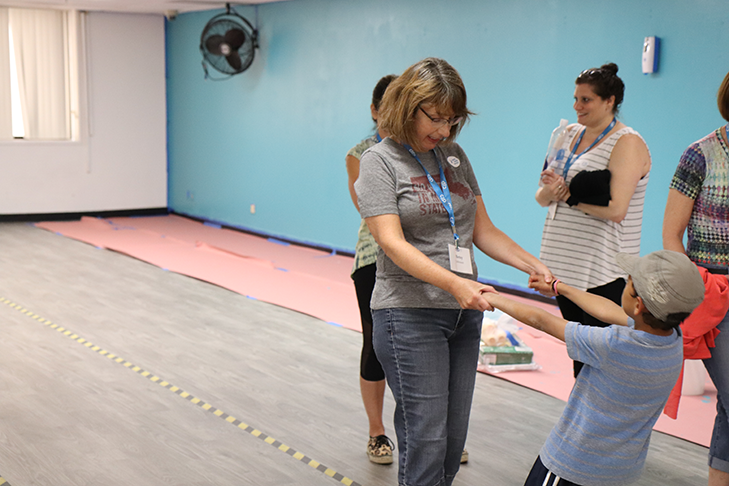When I announced my plan to spend a part of my summer volunteering at shelter for newly-arrived immigrants across the country, my friends and family were surprised. My year had had its own share of family struggles and trials. Why then would I want to fly across the country and work with people I didn’t even know? So, when I joined CJP’s Women’s Philathropy to volunteer at the shelter, and I’m not sure I fully understood why. Certainly, as a mom, I joined most of the world in feeling broken-hearted when learning about family separations and conditions in detention centers. And like most, I have felt helpless, so when the opportunity to do something — anything — came along, I jumped at the call.
After a brief orientation, we rode to the shelter in a bus. Sitting amid palm trees in the heart of San Diego was a building set back with fencing and armed guards. We walked in as a group, each checking in with the guard with our IDs. Once inside, a staff member welcomed us and gave us a quick tour, showing us the large room spattered with army cots, a cafeteria, stock rooms for donated items, a make-shift playroom for the smaller children, a medical clinic, and my favorite — the fenced-in rooftop play area, the only place the guests are permitted outside.
My first morning, I learned quickly that most of the tasks at the shelter are menial. I was assigned to sort clothing into bins by gender and size. We mopped floors and sanitized surfaces. We power-washed the army cots. We served food, and couriered food to the families in medical quarantine. I hardly saw or interacted with anyone. It was hard work, and I asked myself if I was even making a difference.
That evening, Rabbi Elyse Winick, Senior Director, Learning & Engagement at CJP, gave a brief talk on the topic of “home.” She challenged us to ask what “home” meant to us, and what would happen if we were forced from our home. How could we, as volunteers, with our relative affluence and privilege, in just a few days, and with a language barrier, possibly create a “home” for these families? “We can create home through our intent,” she softly answered.
And so I poured my heart into my tasks. I imagined the families who would receive the shirts that I gently folded and placed into the bins. I smiled and greeted the weary father who received my meal in the quarantined room. I was extra careful when sanitizing surfaces as I imagined toddler hands gripping the banister as they navigated the stairs.
The following days were marked with more chores, but also more time to meet the families and spend time with them.
Our lives, when broken down and simplified, are a menagerie of moments. And there are so many I will hold from this experience. Moments of good and moments of bad, and everything in between and mixed and melted of the two into each other.
The moment I placed my hand to my heart as I handed over the food to a mother who returned the gesture. The moments of “follow the leader” with eight-year-old Anthony as we stomped, jumped, hopped, slid, and danced through the dormitory. The man in quarantine lying on the bed who, when I approached, apologized to me for what I do not even know, as if his ramshackle body should take the blame or be accountable for my feelings of discomfort at seeing him in such ill form. The moment when I saw three small children rolling balls to each other and giggling. The Haitian woman with the blank eyes who sat in a far corner and silently stared at the wall. The two Russian families who found each other at the shelter and formed their own “extended family.” Sitting on the ground with a nine-year-old girl drawing hearts with chalk, because we don’t need Google Translate to find shared language. The bottle of water offered to a volunteer from a child who wanted to give back to the woman who had been playing soccer with him for 45 minutes. All we have and all we can do with the time we’re here to wander and meander around this beautiful ball of light and wonder and joy and heartbreak and aching of always, is to tie bits of ourselves to these moments that shape us. Let them breathe as we breathe.
As our time with the guests ended, the larger reason I came began to become clearer to me — to affirm our connection. I’m so powerfully moved by the thread that pulls between us, the things we recognize everywhere, regardless of culture, language, or religion.
Our humanity is bound up in one another’s. And in the midst of this inhumanity at the border, we should not forget that we are all spinning together, one group on this Tilt-a-Whirl in the eternity of space. We are here together, and what happens to one of us happens to all of us. We are one face with one set of eyes, staring into the darkness together, searching for and chasing the light. We are one set of lungs, breathing the same air, hoping it is fresh. This is our home. This is our family. Let us love.
Betsy Johnson participated in the Women’s Philanthropy Tzedek Mission. This blog was originally published here.


